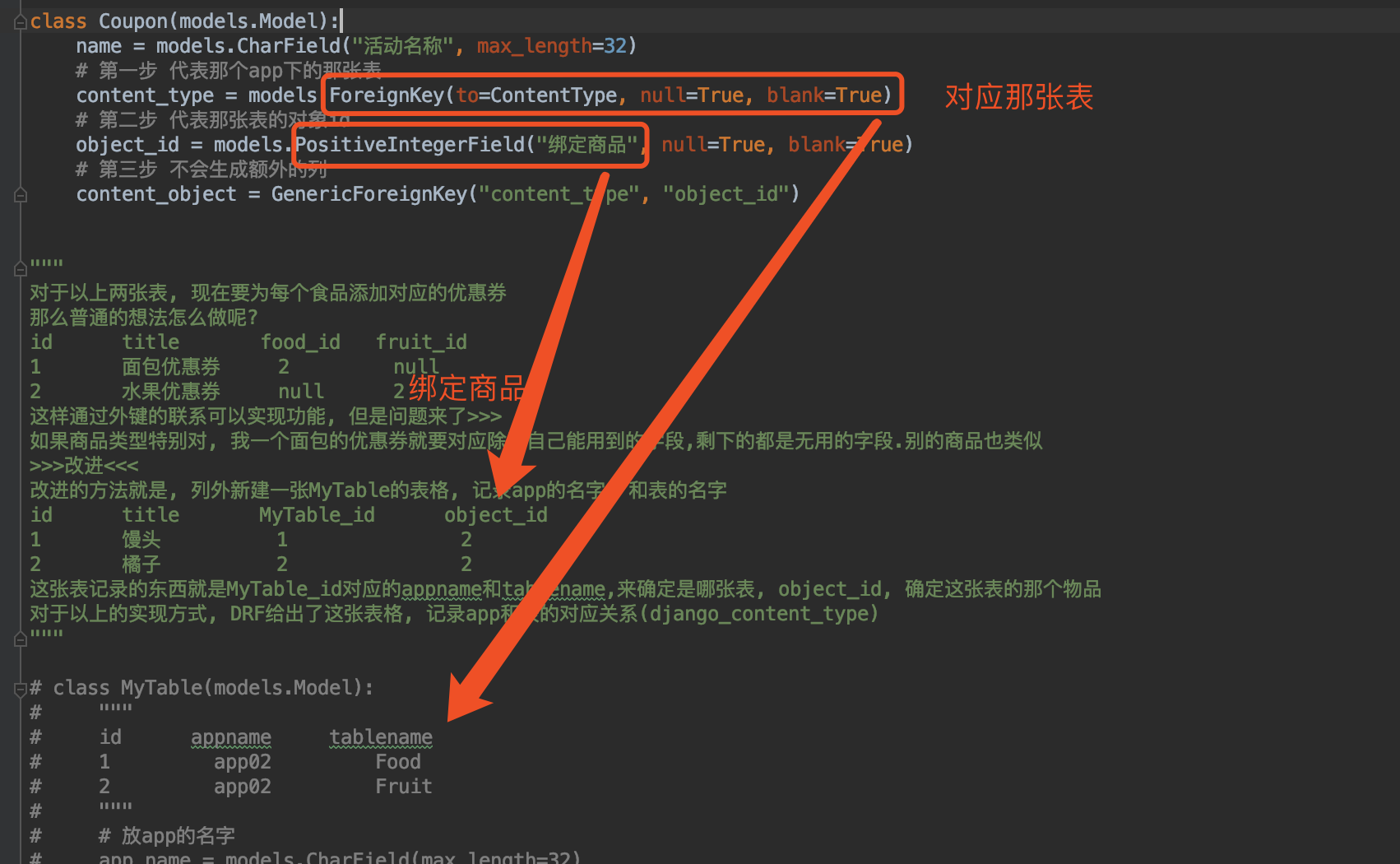Django ContentType组件
需求
现在我们有这样一个需求~我们的商城里有很多的商品~~节日要来了~我们要搞活动~~
那么我们就要设计优惠券~~优惠券都有什么类型呢~~满减的~折扣的~立减的~~
我们对应着我们活动类型~对我们的某类商品设计优惠券~~比如~~
家电是一类商品~~食物是一类商品~那么我们可以设计家电折扣优惠券~~以及食物满减优惠券等~
那么我们看表结构怎么设计~~

from django.db import models class Appliance(models.Model): """ 家用电器表 id name 1 冰箱 2 电视 3 洗衣机 """ name = models.CharField(max_length=64) class Food(models.Model): """ 食物表 id name 1 面包 2 牛奶 """ name = models.CharField(max_length=32) class Fruit(models.Model): """ 水果表 id name 1 苹果 2 香蕉 """ name = models.CharField(max_length=32) class Coupon(models.Model): """ 优惠券表 id name appliance_id food_id fruit_id 1 通用优惠券 null null null 2 冰箱折扣券 1 null null 3 电视折扣券 2 null null 4 苹果满减卷 null null 1 我每增加一张表就要多增加一个字段 """ name = models.CharField(max_length=32) appliance = models.ForeignKey(to="Appliance", null=True, blank=True) food = models.ForeignKey(to="Food", null=True, blank=True) fruit = models.ForeignKey(to="Fruit", null=True, blank=True)<br># 实际上我们商品的种类会特别的多,导致我们这张表外键越来越多
遇到这种一张表要跟多张表进行外键关联的时候~我们Django提供了ContentType组件~
ContentType组件
ContentType是Django的内置的一个应用,可以追踪项目中所有的APP和model的对应关系,并记录在ContentType表中。
当我们的项目做数据迁移后,会有很多django自带的表,其中就有django_content_type表,我们可以去看下~~~
ContentType组件应用:
-- 在model中定义ForeignKey字段,并关联到ContentType表,通常这个字段命名为content-type
-- 在model中定义PositiveIntergerField字段, 用来存储关联表中的主键,通常我们用object_id
-- 在model中定义GenericForeignKey字段,传入上面两个字段的名字
-- 方便反向查询可以定义GenericRelation字段
代码如下:

from django.db import models from django.contrib.contenttypes.models import ContentType from django.contrib.contenttypes.fields import GenericForeignKey, GenericRelation class Appliance(models.Model): """ 家用电器表 id name 1 冰箱 2 电视 3 洗衣机 """ name = models.CharField(max_length=64) coupons = GenericRelation(to="Coupon") class Food(models.Model): """ 食物表 id name 1 面包 2 牛奶 """ name = models.CharField(max_length=32) class Fruit(models.Model): """ 水果表 id name 1 苹果 2 香蕉 """ name = models.CharField(max_length=32) class Coupon(models.Model): """ 优惠券表 id name appliance_id food_id fruit_id 1 通用优惠券 null null null 2 冰箱折扣券 1 null null 3 电视折扣券 2 null null 4 苹果满减卷 null null 1 我每增加一张表就要多增加一个字段 """ name = models.CharField(max_length=32) # appliance = models.ForeignKey(to="Appliance", null=True, blank=True) # food = models.ForeignKey(to="Food", null=True, blank=True) # fruit = models.ForeignKey(to="Fruit", null=True, blank=True) # 第一步 content_type = models.ForeignKey(to=ContentType) # 第二步 object_id = models.PositiveIntegerField() # 第三步 content_object = GenericForeignKey('content_type', 'ob
数据迁移后~添加数据~我们看下增删改查的操作~~

from django.http import HttpResponse from rest_framework.views import APIView from rest_framework.response import Response from django.contrib.contenttypes.models import ContentType from .models import Appliance, Coupon # Create your views here. class Test(APIView): def get(self, request): # 通过ContentType获得表名 content = ContentType.objects.filter(app_label="app01", model="appliance").first() # 获得表model对象 相当于models.Applicance model_class = content.model_class() ret = model_class.objects.all() # 为海尔冰箱创建一条优惠记录 ice_box = Appliance.objects.filter(id=1).first() Coupon.objects.create(name="海尔冰箱折扣券", content_object=ice_box) # 查询优惠券id=1绑定了哪个商品 coupon_obj = Coupon.objects.filter(id=1).first() goods_obj = coupon_obj.content_object print(goods_obj.name) # 查询海尔冰箱的所有优惠券 id=1 # 我们定义了反向查询 results = ice_box.coupons.all() print(results[0].name) # 如果没定义反向查询 content = ContentType.objects.filter(app_label="app01", model="appliance").first() result = Coupon.objects.filter(content_type=content, object_id=1).all() print(result[0].name) return HttpResponse(ret)
详细说明:

from django.db import models class Food(models.Model): """ id title 面包 馒头 """ title = models.CharField(max_length=32) class Fruit(models.Model): """ id title 苹果 橘子 """ title = models.CharField(max_length=32) """ 对于以上两张表, 现在要为每个食品添加对应的优惠券 那么普通的想法怎么做呢? id title food_id fruit_id 面包优惠券 2 null 水果优惠券 null 2 这样通过外键的联系可以实现功能, 但是问题来了>>> 如果商品类型特别对, 我一个面包的优惠券就要对应除了自己能用到的字段,剩下的都是无用的字段.别的商品也类似 >>>改进<<< 改进的方法就是, 列外新建一张MyTable的表格, 记录app的名字, 和表的名字 id title MyTable_id object_id 馒头 1 2 橘子 2 2 这张表记录的东西就是MyTable_id对应的appname和tablename,来确定是哪张表, object_id, 确定这张表的那个物品 对于以上的实现方式, DRF给出了这张表格, 记录app和表的对应关系(django_content_type) """ # class MyTable(models.Model): # """ # id appname tablename # 1 app02 Food # 2 app02 Fruit # """ # # 放app的名字 # app_name = models.CharField(max_length=32) # # 表名字 # table_name = models.CharField(max_length=32)


from django.db import models from django.contrib.contenttypes.models import ContentType from django.contrib.contenttypes.fields import GenericForeignKey, GenericRelation class Food(models.Model): """ id title 面包 馒头 """ title = models.CharField(max_length=32) class Fruit(models.Model): """ id title 苹果 橘子 """ title = models.CharField(max_length=32) class Appliance(models.Model): name = models.CharField(max_length=64) coupons = GenericRelation(to="Coupon") class Coupon(models.Model): name = models.CharField("活动名称", max_length=32) # 第一步 代表那个app下的那张表 content_type = models.ForeignKey(to=ContentType, null=True, blank=True) # 第二步 代表那张表的对象id object_id = models.PositiveIntegerField("绑定商品", null=True, blank=True) # 第三步 不会生成额外的列 content_object = GenericForeignKey("content_type", "object_id")

class TestView(APIView): def get(self, request): # 给山东大馒头加优惠券 food_obj = Food.objects.filter(id=1).first() # Coupon.objects.create(title="买一赠一", content_obj=food_obj) # 查看山东大馒头有哪些优惠券 for coupon in food_obj.coupons.all(): print(coupon.title) # 查看优惠券绑定的商品 coupon_obj = Coupon.objects.first() print(coupon_obj.content_obj.title) return Response("ok")








 浙公网安备 33010602011771号
浙公网安备 33010602011771号